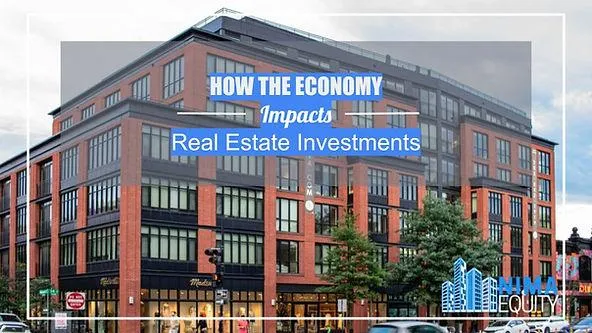
How The Economy Impacts Real Estate Investments
Real estate is one of the most reliable ways to build wealth. Its ability to generate steady income, appreciate over time, and hedge against inflation makes it a go-to asset for investors looking to build wealth that can weather economic ups and downs.
But real estate doesn’t exist in a bubble—it’s directly affected by the economy. Key economic factors like interest rates, inflation, and indicators such as GDP growth and unemployment greatly impact the real estate market, influencing everything
from property values to rental demand.
In this article, we’ll discuss these economic concepts and their impact on real estate investments.
Interest Rates
Interest rates represent the cost of borrowing money. Central banks, like the Federal Reserve in the U.S., adjust rates to influence economic conditions. A lower rate makes borrowing cheaper, while higher rates make it more expensive.
High Interest Rates: When rates climb, mortgage costs rise, reducing affordability for buyers and decreasing investors’ cash flow. Higher costs can also lower demand, leading to slower price growth or even price declines.
Low Interest Rates: When rates fall, borrowing becomes more affordable. This often leads to an increase in demand for properties, driving up prices and creating opportunities for refinancing or expanding portfolios.
Consider the pandemic era, when interest rates hit historic lows. The housing market boomed as buyers rushed to secure cheap loans. However, in 2023, rates climbed as the Fed sought to combat inflation, slowing real estate activity.
Inflation
Inflation is the gradual increase in the prices of goods and services. It reduces purchasing power over time, making today’s dollar worth less tomorrow.
On the positive side, real estate acts as a hedge against inflation. As prices rise, so do property values and rental prices, helping investors maintain their purchasing power. For example, a property that rents for $1,500 today may command $1,800 in a few years, preserving its value in real terms.
However, inflation also increases construction and maintenance costs, which can eat into profits. Moreover, inflation often leads to higher interest rates, making loans and refinancing options more expensive.
Economic Indicators
Economic factors are like signals that show the health of the real estate market. They help investors understand whether the market is moving up, slowing down, or staying steady. By paying attention to these indicators, you can spot opportunities and avoid pitfalls. Let’s explore some of the most important economic factors and how they shape real estate investments.
GDP Growth
A growing Gross Domestic Product (GDP) is a sign of a healthy economy, often leading to job creation and higher demand for real estate. On the other hand, a stagnant or declining GDP can slow the market, reducing property values and transaction volumes.
Unemployment Rates
Low unemployment boosts housing demand, as more people have the means to buy or rent. High unemployment, however, can lead to vacancies and increased rental defaults.
Consumer Confidence Index (CCI)
This measures how optimistic consumers feel about the economy. High confidence usually leads to more spending and real estate transactions, while low confidence can slow the market.
Regional Trends
There are certain U.S. markets that showcase these dynamics. For example, cities like Austin and Dallas have seen significant job growth and population increases, driving demand for real estate.
Tracking these indicators helps investors predict market trends and adjust strategies. For example, focusing on high-growth regions during economic booms or shifting to stable markets during downturns can reduce risks and maximize returns.
Tips to Adapt to Economic Changes
Diversify Investments: Diversification means spreading your investments across different property types, such as residential, commercial, or mixed-use, and locations. For example, owning single-family homes in suburban areas can balance the volatility of urban commercial spaces. If one market or sector faces a downturn, your entire portfolio won't be at risk. Diversification helps protect your investments from localized issues, like a regional economic slowdown or industry-specific challenges.
Monitor Trends: Follow key reports like Federal Reserve announcements about interest rate changes, employment statistics, and inflation updates. For instance, if the Federal Reserve signals a rate hike, you might lock in a fixed-rate mortgage before borrowing costs rise. Regularly tracking economic news allows you to adapt quickly, whether that’s adjusting your financing strategies, shifting your property focus, or even holding off on a big purchase until the market stabilizes.
Leverage Tax Advantages: Tax laws offer numerous opportunities to boost your returns in real estate. A common example is the 1031 exchange, which allows you to defer capital gains taxes when you sell one property and reinvest in another. This strategy helps you grow your portfolio faster without losing money to taxes. Additionally, deducting mortgage interest on your taxes can reduce your taxable income. Other benefits include depreciation deductions for rental properties, which can offset your earnings and improve your overall profitability.
Conclusion
Real estate is one of the most reliable ways to build wealth, offering long-term rewards that can adapt to economic ups and downs. As your properties grow in value, so will your financial stability. As an investor, understanding these economic factors allows you to make better decisions and build a portfolio that can handle any market condition.
If you want to accelerate your success and minimize risks, consider partnering with experienced investors. Working with seasoned professionals can provide valuable insights and help guide you, so you can enjoy the benefits of real estate no matter the economic outlook.
